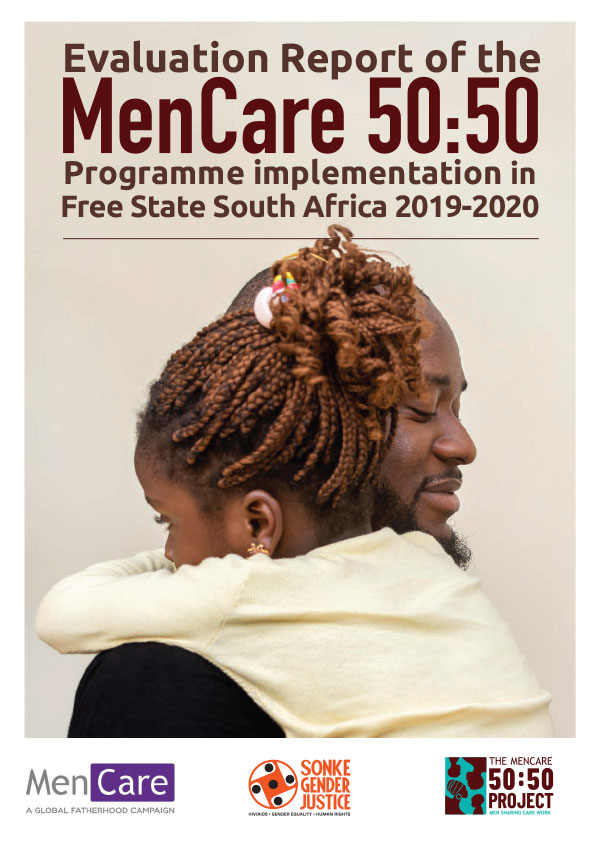The report presents findings from an evaluation of the MenCare 50:50 programme implemented through educational sessions with men and couples to promote gender equality in homes and improve overall family well-being. This is with the aim of promoting positive and equitable empowerment for women, and improvement in the caring of children. Implementors were trained on the MenCare 50:50 programme to recruit couples for educational sessions meant to address gender inequality in households. Specifically, the programme sought to change attitudes and behaviour towards women’s participation in paid work; equitable household decision-making; men’s participation in unpaid care work and women’s involvement in household decision-making, and in deciding about their own earnings.
Publication Type: Donor Reports
-
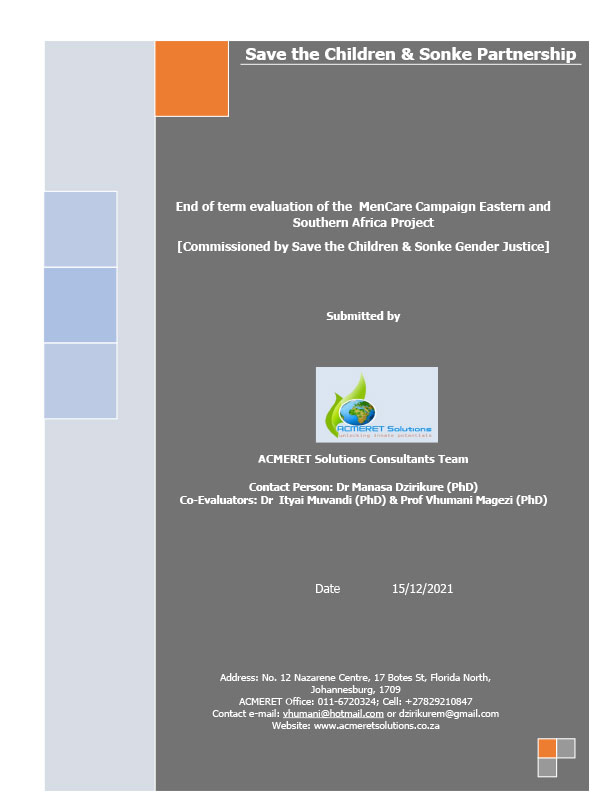
End of term evaluation of the MenCare Campaign Eastern and Southern Africa Project
This report presents findings of the end of term evaluation of the MenCare Campaign Eastern and Southern Africa Project commissioned by Save the Children & Sonke Gender Justice. The project was implemented in six Sub-Saharan African countries, namely Ethiopia, Kenya, Mozambique, Tanzania, Zambia and Zanzibar. The project has been implemented since 2017 and will end in 2021 The evaluation aims to:
- determine the extent to which the project has achieved its stated outcomes;
- highlight challenges experienced in the implementation of the project and how/if these challenges affected the project implementation;
- critically assess the strategies employed to overcome the experienced challenges; and
- document lessons learnt from the project.
-
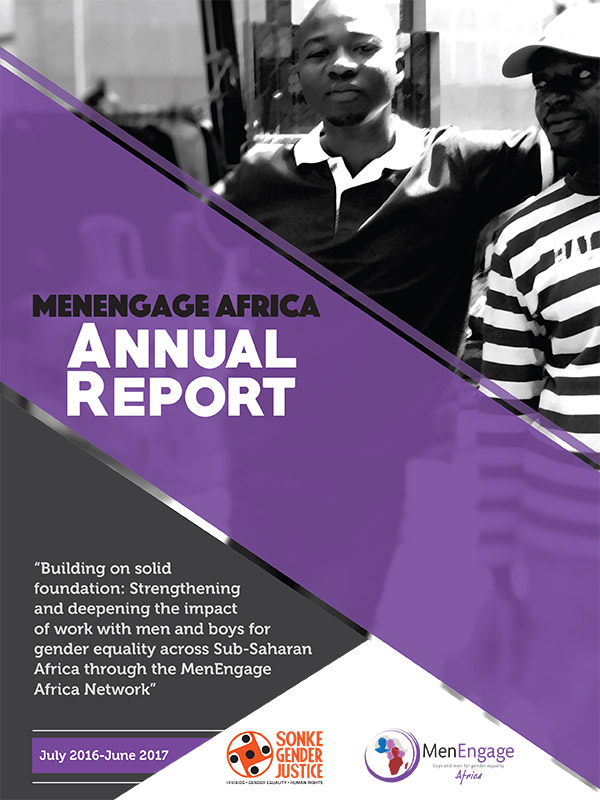
MenEngage Africa Annual Report
MenEngage Africa (MEA) – which was formed out of a global initiative, the MenEngage Alliance, in 2008 – has grown from its base in the Southern African Development Community (SADC) region to Central and East Africa and now into the Francophone West African countries. To date, the network is operating in 22 countries – with sub grants being provided to partners in 10 focus countries – and requests to expand the network even further continue to be received.
The MEA programme seeks to increase gender equality and improve sexual and reproductive sexual health of both men and women in Sub-Saharan Africa by engaging men and boys to transform gender norms, in uence policies and promote human rights and accountability.
This report provides an overview of the achievements made during the third year (2016-2017) of a four year grant provided by the Swedish International Development Cooperation Agency (SIDA) and the Norwegain Agency for Development Cooperation (NORAD).
-
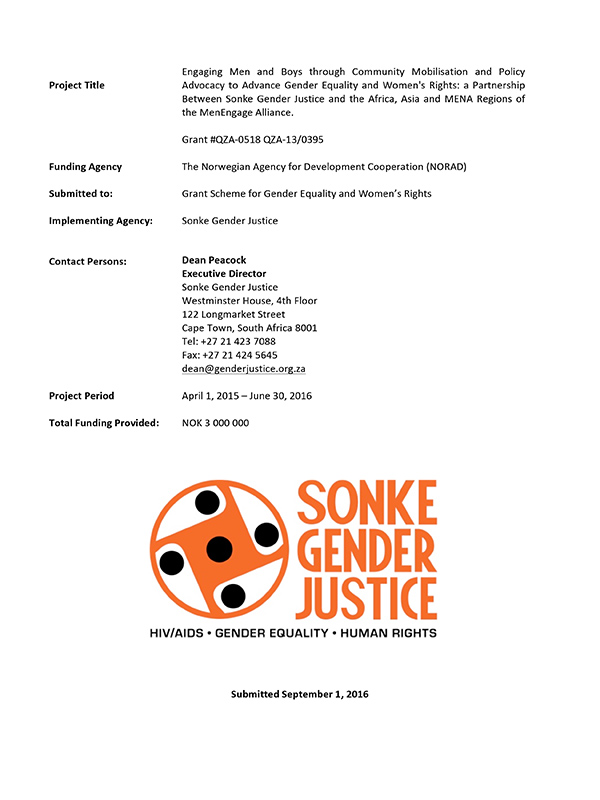
Sonke Report to Norad
In 2013, NORAD approved a grant in the amount of NOK 6.1 million, which was supported by a follow up grant of NOK 3 million in 2015, for the period April 1 to December 31, 2015, and subsequently extended to June 30, 2016. This current grant scheme for women’s rights and gender equality builds on the work funded by NORAD over the previous 18 months, and proposed that Sonke and MenEngage Asia, Africa and MENA increase the scale, impact and sustainability of the work through the following five key objectives:
- Sonke, the Centre for Health and Social Justice in India and the ABAAD Resource Centre for Gender Equality in Lebanon to coordinate a series of South-South peer exchanges to build the operational and programmatic capacity and sustainability of MenEngage Alliance networks at national and regional levels in the Africa, MENA and South Asia regions, and to further develop and disseminate key outcomes from the 2014 MenEngage Global Symposium funded by NORAD.
- Develop, pilot and share models for supporting men and women to engage in community mobilisation and local activism to respond to and prevent Gender Based Violence.
- In all three regions, but with an emphasis in Africa, engage religious and traditional leaders to increase their proactive support for gender equality, SRHR and LGBTI rights.
- Develop tools and support local capacity building to ensure widespread implementation of the NORAD funded MenEngage SRHR platform developed in the previous grant cycle.
- Strengthen Sonke and MenEngage communications capacity, in Africa, Asia and the MENA region.
-
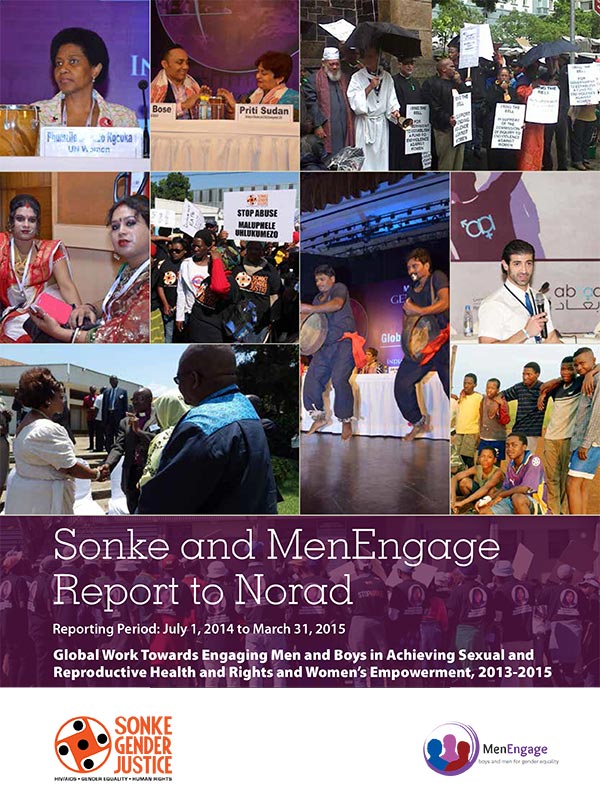
Sonke and MenEngage Report to Norad
During this final reporting period, Sonke and the MenEngage Alliance have successfully achieved the three objectives we were funded to pursue:
- Building the operational and programmatic capacity and sustainability of both Sonke Gender Justice in South Africa and MenEngage networks at the national, regional and global levels so that they can better increase men’s involvement in preventing gender based violence, improving sexual and reproductive health and rights, and advancing gender equality.
- Developing and sharing three interrelated advocacy campaigns to be adapted and implemented at the national and regional levels to i) increase men’s support for sexual and reproductive health and rights, ii) engage religious leaders and faith-based organisations to increase their proactive support for gender equality, SRHR and LGBTI rights; and iii) engage men as involved, non-violent fathers and caregivers.
- Developing more effective Sonke and MenEngage communications strategies, including: new, updated and extended database, a more complex and updated website, social media strategies and engagement with key media platforms.
-
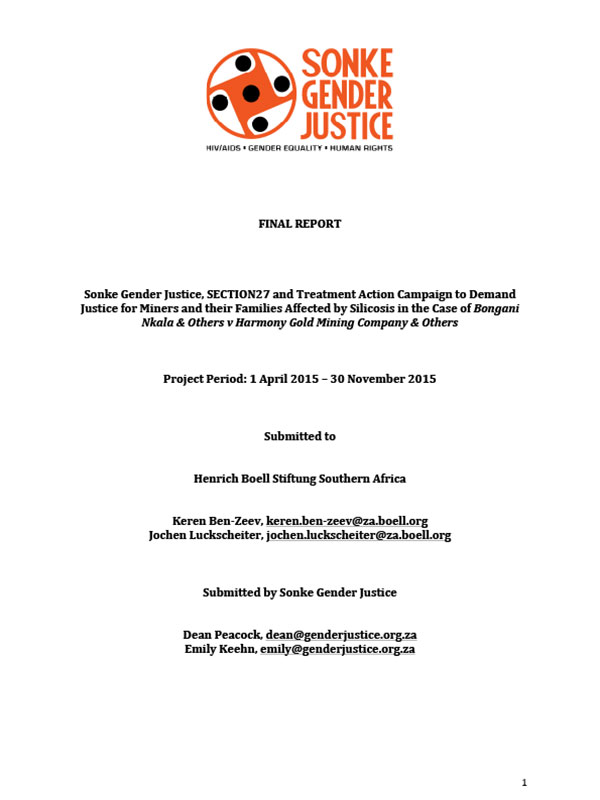
Sonke Gender Justice, SECTION27 and Treatment Action Campaign to Demand Justice for Miners and their Families Affected by Silicosis in the Case of Bongani Nkala & Others v Harmony Gold Mining Company & Others
Sonke Gender Justice (Sonke), the Treatment Action Campaign (TAC), and SECTION27 worked collaboratively on this project to conduct media advocacy, research and documentation to raise awareness on silicosis and tuberculosis (TB) in the gold mines of South Africa, as well as to support the class action lawsuit by applying to be amici curiae in the historic Bongani Nkala & Others v Harmony Gold & Others class action lawsuit. In the course of this project, Sonke and TAC were admitted as amici. The admission of Sonke and TAC as amici enabled the submission of evidence that the courts considered missing but pertinent to the lawsuit, specifically the gendered impact of the mining related lung diseases, including the unpaid caregiving provided by women and children in mine-sending communities and the ripple effects of having to dedicate time, money, and personal well-being to provide this care. Sonke conducted original field research in mine-sending communities informing the public campaigning that took place over the course of the project. There was extensive media coverage of the case and the substantive issues it raises, and influential media advocacy tools were produced including documentary films, a series of portraits, and more. All of these efforts culminated in a thousand-person march to support the certification of the class action and public interactive exhibits of the portraits, as well as the airing of the documentary film on national television.
-
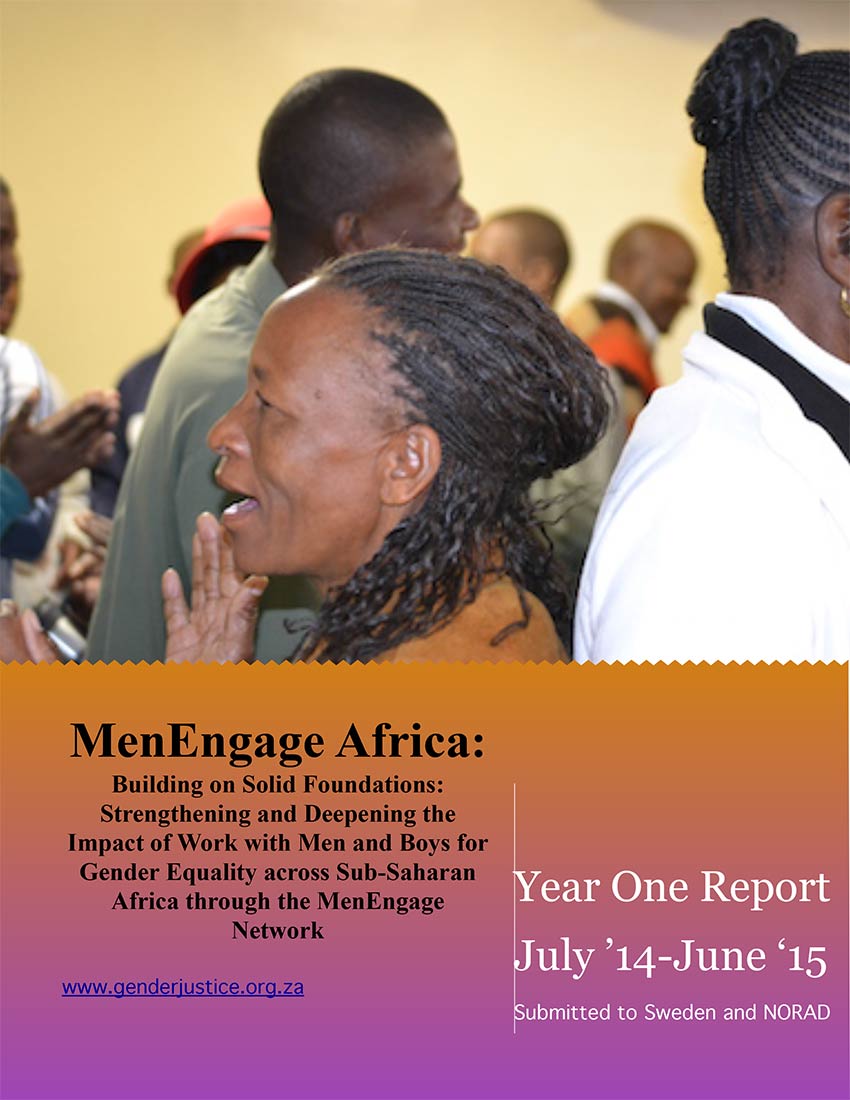
MenEngage Africa: Building on Solid Foundations
This report provides an overview of all the work done by the MenEngage Africa network under the guidance of Sonke’s International Programmes and Networks (IPN) unit to strengthen and deepen the work done with boys and men to promote gender equality in sub-Saharan Africa between July 2014 and June 2015. The work reported herein is supported by a grant by SIDA Zambia.
-
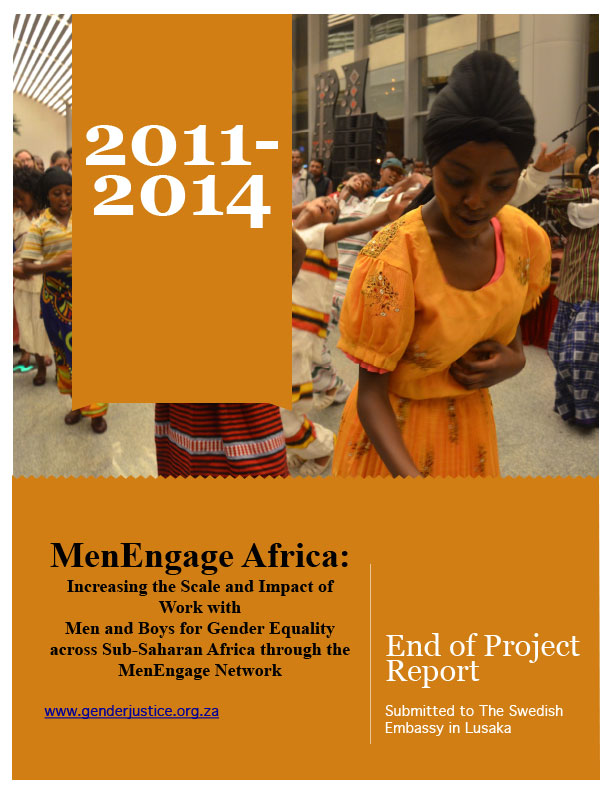
MenEngage Africa: Increasing the Scale and Impact of Work with Men and Boys for Gender Equality across Sub-Saharan Africa through the MenEngage Network
Sonke, through the MenEngage Africa alliance, implemented the project to strengthen work with men and boys for gender equality in the region for three years from 2011 to 2014. In 2011 when the project was initiated, it sought to address the gap that existed between advances made in providing responses to gender-based violence, and interventions that were aimed at preventing violence and addressing underlying causes such as rigid gender norms. The project acknowledged the fact that despite gains made in improving gender equality, gender inequality continued to undermine democracy, impede development and compromise people’s lives. There was evidence showing that contemporary gender roles, and especially rigid notions of manhood, contribute to gender-based violence, sexual exploitation and abuse, and exacerbated the spread and impact of HIV and AIDS.
This report provides detailed lessons learned over the three-year project implementation period and highlights some of the unintended results and risks from which lessons for future work are able to be drawn. Unlike the annual project updates, this report will not focus on specific activities implemented over the three years. It will rather focus on high level results that we have been able to achieve and the change that the project has effected within the network and in the region as a whole.
-
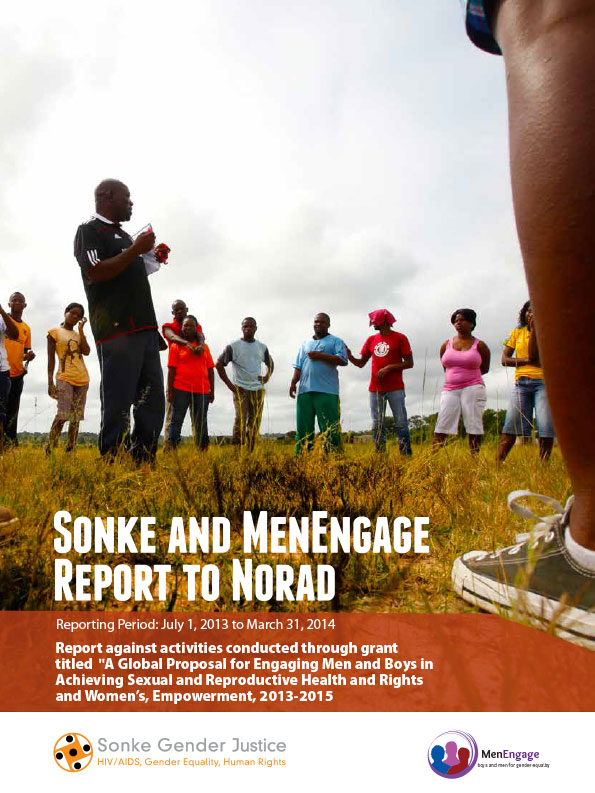
Sonke and MenEngage Report to NORAD
Sonke and the MenEngage Alliance have made enormous progress against the three objectives they were funded to pursue by NORAD:
- Building the operational and programmatic capacity and sustainability of both Sonke Gender Justice in South Africa and MenEngage networks at the national, regional and global levels so that they can better increase men’s involvement in preventing gender based violence, improving sexual and reproductive health and rights, and advancing gender equality.
- Developing and sharing three interrelated advocacy campaigns to be adapted and implemented at the national and regional levels to i) increase men’s support for sexual and reproductive health and rights, ii) engage religious leaders and faith-based organisations to increase their proactive support for gender equality, SRHR and LGBTI rights; and iii) engage men as involved, non-violent fathers and caregivers.
- Developing more effective Sonke and MenEngage communications strategies, including: new, updated and extended database, a more complex and updated website, social media strategies and engagement with key media platforms.
Both Sonke and the MenEngage Alliance are now stronger than they were at the beginning of the grant, the MenCare and SRHR campaign have grown substantially in both reach and impact, including through in-depth work with religious leaders in South Africa, Swaziland, Rwanda, Burundi and the Democratic Republic of Congo. Similarly, the communications infrastructure has been dramatically improved, with a new MenEngage Alliance website now in place, regular MenCare newsletters going out to thousands of people, and a template in place for monthly MenEngage news “blasts” that provide people across the globe with detailed updates on MenEngage activities.
-
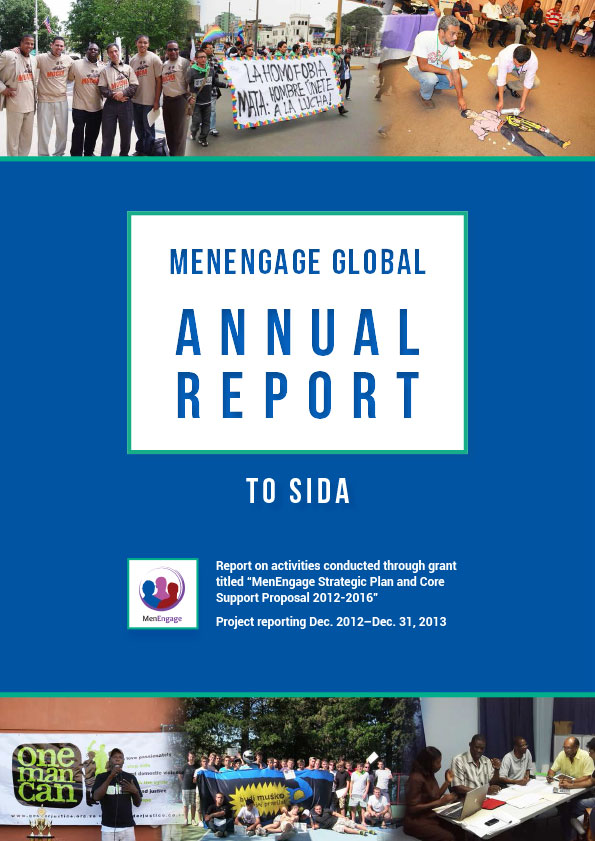
MenEngage Global Annual Report to SIDA
This report is a snapshot of the key achievements and deliverables against the first year of the MenEngage strategic plan agreed upon by SIDA and Sonke. It is structured around the four result areas of the project, with a separate section for the regional reports. Under each area, activities are presented, followed by key results. The report ends with concluding remarks regarding achievements, challenges and future activities.
-
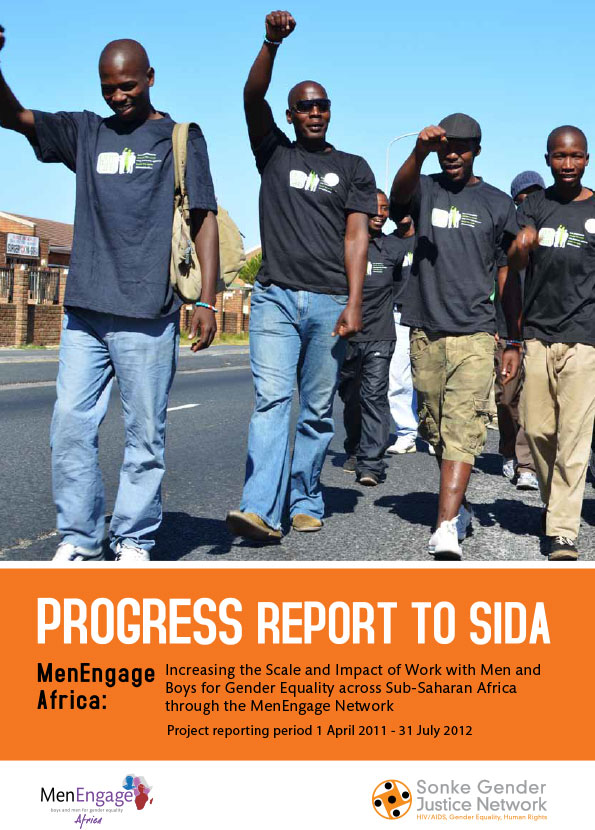
MenEngage Africa: Progress Report to Sida
With the aim of effectively scaling-up work with men and boys to promote gender equality, prevent gender-based violence (GBV) and the sexual exploitation of children, and reduce the spread and impact of HIV and AIDS across Sub-Saharan Africa, Sonke on behalf of the MenEngage Africa network, coordinates this Sida-funded project in order to work towards achieving the following objectives:
- Formalise MenEngage regional and country networks in East and Southern Africa and establish them as key networks for engaging men and boys in reducing gender-based violence and sexual exploitation.
- Strengthen strategic alliances between MenEngage structures in SubSaharan Africa and other key partners, including especially children’s rights, women’s rights, LGBTI, PLHIV and other social justice movements, as well as key UN agencies, to carry out joint campaign and advocacy activities.
- Develop a shared policy and advocacy agenda on work with men and boys for gender equality and the prevention of sexual violence in East and Southern Africa.
- Implement the International Men and Gender Equality Survey (IMAGES) in two countries.
- Support the development, launch and operation of a new ‘MenEngage Africa Training Initiative’, providing at least one hundred and five hours of training to MenEngage partners in how to enhance and scale up their work, and apply evidence-based approaches in engaging men and boys in reducing GBV and sexual violence.
This report provides an overview of the achievements and challenges faced in working towards these objectives across the period from April 2011 – July 2012.
-
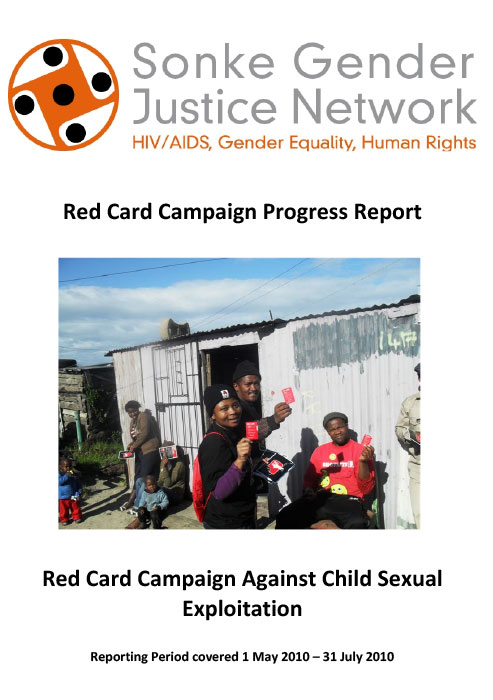
Red Card Campaign Progress Report
On 9 June 2010, just days before the launch of the World Cup, Sonke officially launched the Red Card Campaign against Child Sexual Exploitation. The campaign was activated in a number of sites across Johannesburg and the Western Cape, with additional activities taking place in Port Elizabeth. In essence, the campaign seeks to reduce children, and especially girl’s, vulnerability to sexual exploitation in South Africa and elsewhere in Southern Africa. The initiative also seeks to increase awareness regarding sexual exploitation generally and increase the ability and willingness of people to intervene to prevent and/or report it.
In preparation for the campaign activation day, Sonke conducted training in both sites with selected volunteers from different communities. The training focused on forms of sexual exploitation, particularly involving children, and on how to use the Red Card as a tool to stop it. Participants learnt about “red card fouls”, such as having sex with someone under age or buying stuff to get sex from a young person, and were equipped with red cards to use when the encounter any of these situations.
Selected partner organisations were also been engaged, sensitised and trained on the Red Card methodology and assisted in the role out of the campaign.
This progress report describes in detail the progress to date and the activities that have been implemented by Sonke and the partners during the period from May to July 2010. The report consists of four sections:
- A brief description of the project goals and objectives
- A narrative chronicling the achievements and activities implemented during this period
- The challenges faced and lessons learnt
- The conclusion and recommendations
-
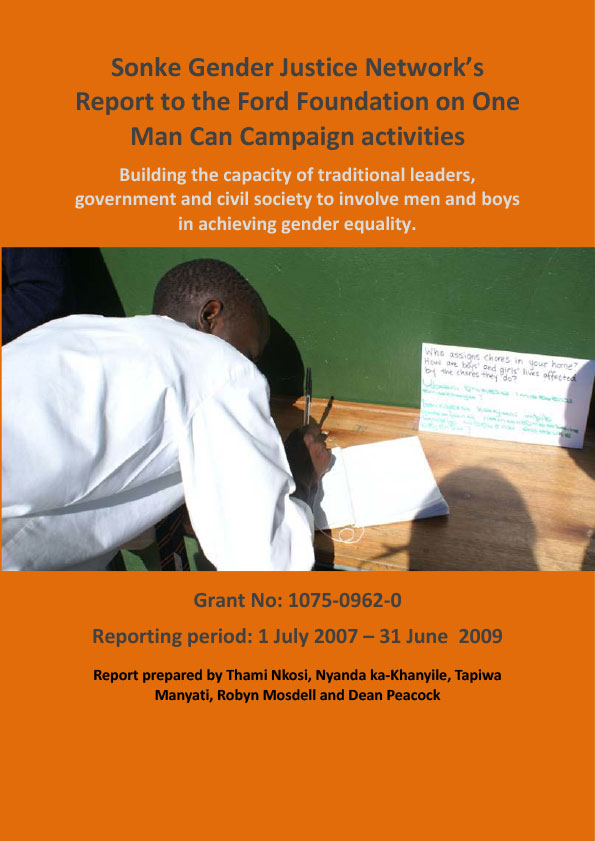
Sonke Gender Justice Network’s Report to the Ford Foundation on One Man Can Campaign activities
This project built on Sonke’s proven experience in working with men to develop a unique and effective model for mainstreaming men into the care economy, in line with South African national plans addressing gender-based violence, halting the spread of HIV/AIDS and providing for orphans and vulnerable children.
The report that follows describes and chronicles in greater detail the range of activities carried out by Sonke with Ford Foundation support in Gauteng and Limpopo during the period 1 July 2007 – 30 June 2009. The report is divided into three sections: an introductory narrative section describing key project progress and impact, a log frame listing achievements against project commitments, and a final section with annexures containing supporting documentation and case studies.
-
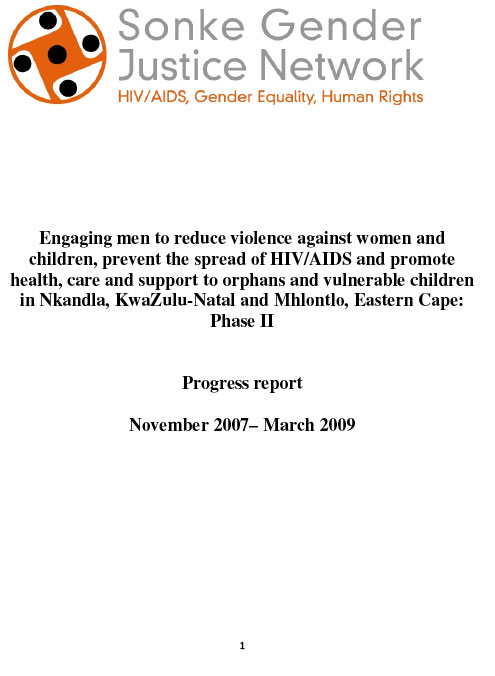
Engaging men to reduce violence against women and children, prevent the spread of HIV/AIDS and promote health, care and support to orphans and vulnerable children in Nkandla, KwaZulu-Natal and Mhlontlo, Eastern Cape: Phase II
Since November 2006, Sonke has implemented a ground-breaking two-phased ‘demonstration’ project on gender and parenting in 2 municipalities in rural KwaZulu-Natal and the Eastern Cape with funding from UNICEF. The project was carried out in two sites where violence levels are high – Nkandla, KwaZulu-Natal, and OR Tambo, Eastern Cape. Phase I of the project took place between November 2006 and August 2007. Phase II of the project built on baseline research conducted during Phase I, as well as Sonke’s proven experience and success of involving men in HIV/AIDS and violence prevention programmes.
The project had two primary objectives. Firstly, it aimed to increase men’s involvement, not only in the lives of their own children, but also in ensuring that children in general, and orphans and vulnerable children in particular, have access to essential care and support. As such, the project has encouraged men to play an active role in making sure that children are able to access child grants, attend school and have their psycho-social and educational needs met. Secondly, the project aimed to build men’s capacity to become actively involved in eliminating violence against women and children, preventing the spread of HIV and AIDS and promoting gender equality.
This report provides a brief overview of key achievements during Phase II of the demonstration project in Nkandla, KwaZulu-Natal, and Mthlontlo, Eastern Cape, along with a tables presenting data for both sites, matching the objectives and indicators against targets achieved.
